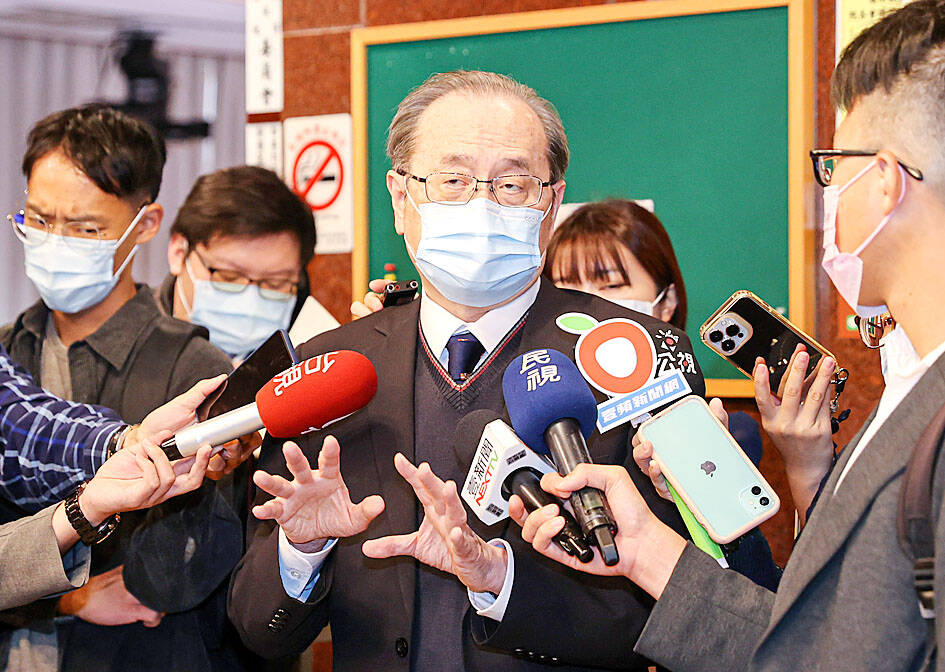Premier Su Tseng-chang (蘇貞昌) yesterday removed Atomic Energy Council minister Hsieh Shou-shing (謝曉星) from his post, effective immediately, citing accusations of harassment and abuse of office, which have “impugned the government’s credibility and fostered an unfriendly and sexist working environment.”
Su said Hsieh’s actions contravene the government’s policy to foster gender equality.
Hsieh’s dismissal came after the Chinese-language Mirror Media last year reported that Hsieh allegedly sexually harassed his female subordinates.

Photo: CNA
Su at the time instructed Executive Yuan Secretary-General Lee Meng-yen (李孟諺) to put together a task force to investigate the issue.
Following a three-month investigation, the task force on Monday said its findings have substantiated the magazine’s allegations that Hsieh’s actions contravened articles 7 and 12 of the Act of Gender Equality in Employment (性別工作平等法).
Hsieh has demonstrated bias in the appointment of his secretaries and other government employees, as well as when approving leave requests, the task force said.
He was fixated on qualifiers such as height, age, looks, blood type, zodiac signs, marital status and family wealth that did not relate to an employee’s professional capabilities, it said.
Hsieh has been known to stare at his female subordinates and have bodily contact with them, the task force said, adding that he also talked about their figures, makeup and clothing.
The task force said that such actions are unbecoming of the head of a ministerial-level agency.
Hsieh tendered his resignation upon learning of the task force’s findings, but he had already been dismissed.
The Executive Yuan apologized to those affected on the government’s behalf, and said it would forward the case to the Control Yuan for further investigation.

A magnitude 5.6 earthquake struck off the coast of Yilan County at 12:37pm today, with clear shaking felt across much of northern Taiwan. There were no immediate reports of damage. The epicenter of the quake was 16.9km east-southeast of Yilan County Hall offshore at a depth of 66.8km, Central Weather Administration (CWA) data showed. The maximum intensity registered at a 4 in Yilan County’s Nanao Township (南澳) on Taiwan’s seven-tier scale. Other parts of Yilan, as well as certain areas of Hualien County, Taipei, New Taipei City, Taoyuan, Hsinchu County, Taichung and Miaoli County, recorded intensities of 3. Residents of Yilan County and Taipei received

Taiwan has secured another breakthrough in fruit exports, with jujubes, dragon fruit and lychees approved for shipment to the EU, the Ministry of Agriculture said yesterday. The Animal and Plant Health Inspection Agency on Thursday received formal notification of the approval from the EU, the ministry said, adding that the decision was expected to expand Taiwanese fruit producers’ access to high-end European markets. Taiwan exported 126 tonnes of lychees last year, valued at US$1.48 million, with Japan accounting for 102 tonnes. Other export destinations included New Zealand, Hong Kong, the US and Australia, ministry data showed. Jujube exports totaled 103 tonnes, valued at

BIG SPENDERS: Foreign investors bought the most Taiwan equities since 2005, signaling confidence that an AI boom would continue to benefit chipmakers Taiwan Semiconductor Manufacturing Co’s (TSMC, 台積電) market capitalization swelled to US$2 trillion for the first time following a 4.25 percent rally in its American depositary receipts (ADR) overnight, putting the world’s biggest contract chipmaker sixth on the list of the world’s biggest companies by market capitalization, just behind Amazon.com Inc. The site CompaniesMarketcap.com ranked TSMC ahead of Saudi Aramco and Meta Platforms Inc. The Taiwanese company’s ADRs on Tuesday surged to US$385.75 on the New York Stock Exchange, as strong demand for artificial intelligence (AI) applications led to chip supply constraints and boost revenue growth to record-breaking levels. Each TSMC ADR represents

TRUST: The KMT said it respected the US’ timing and considerations, and hoped it would continue to honor its commitments to helping Taiwan bolster its defenses and deterrence US President Donald Trump is delaying a multibillion-dollar arms sale to Taiwan to ensure his visit to Beijing is successful, a New York Times report said. The weapons sales package has stalled in the US Department of State, the report said, citing US officials it did not identify. The White House has told agencies not to push forward ahead of Trump’s meeting with Chinese President Xi Jinping (習近平), it said. The two last month held a phone call to discuss trade and geopolitical flashpoints ahead of the summit. Xi raised the Taiwan issue and urged the US to handle arms sales to